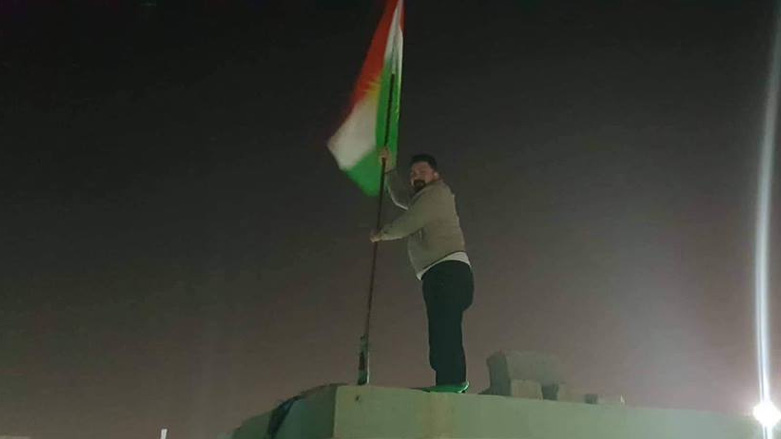Iraqi PM orders removal of Kurdistan flag in Kirkuk, calls it ‘violation of constitution’

ERBIL (Kurdistan 24) – Iraq’s Prime Minister Adil Abdul-Mahdi on Wednesday called on a Kurdish party in Kirkuk to take down the national flag of Kurdistan from their office, calling it “a violation of the Iraqi Constitution.”
On Tuesday evening, the Patriotic Union of Kurdistan (PUK) raised the Kurdistan flag on its office in Kirkuk for the first time since the attack and military takeover of the province by Iraqi forces and Shia militias on Oct. 16, 2017.
Photos and videos posted on Kurdish social media networks show the #Kurdistan flag reportedly raised on the Kurdish PUK party's office in #Kirkuk for the first time since Oct. 16, 2017.#TwitterKurds #Iraq pic.twitter.com/LShuJsYhoL
— Kurdistan 24 English (@K24English) January 8, 2019
Abdul-Mahdi stated that he had held an urgent call with Iraqi President Barham Salih, as the protector of the constitution, regarding the raising of the flag on his party’s office in Kirkuk.
“He [Abdul-Mahdi] called on the various political leaders and directed them to take down the Kurdistan flag from their party office in Kirkuk as it violates the constitution,” a statement the Iraqi prime minister’s press office issued on Wednesday read.
The Iraqi PM urged the political parties to refer to Iraq’s Federal Supreme Court on the constitutionality of the action before taking such steps.
Abdul-Mahdi noted that some Kurdish politicians had contacted him to remind him that Kirkuk is one of the disputed territories between Erbil and Baghdad and, therefore, hoisting the Kurdistan flag alongside the Iraqi one is not unconstitutional based on the province’s current status.
“The Prime Minister stressed that Kirkuk is a disputed area located outside the borders set by the Constitution of the Kurdistan Region and that the disputed areas remain unchanged and no changes should be made about the matter until the case is resolved constitutionally,” the statement added.
It also mentioned that raising flags and slogans of parties in Kirkuk does not violate the constitution.
Though it is possible that Abdul-Mahdi was referring to some Iraqi law or regulation, the only constitutional provision that pertains to flags is Article 12, which contains no specific restrictions to displaying them. It states only that, "The flag, national anthem, and emblem of Iraq shall be regulated by law in a way that symbolizes the components of the Iraqi people."
Although it has a Kurdish majority, Kirkuk also consists of Arabs, Turkmen, and Christians.
After a majority vote on March 28, 2017, the Kirkuk Provincial Council (KPC) decided to hoist the Kurdistan flag along with the Iraqi one on all public offices across the province.
The province has experienced several systematic campaigns of demographic change over the past decades in an aim to Arabize the area and deprive it from the semi-autonomous Kurdistan Region.
The province is disputed between the Iraqi government and the Kurdistan Regional Government (KRG), the status of which, as demanded by the national constitution, was to be settled by 2007 through a referendum where residents could decide on their future. The ongoing differences between Erbil and Baghdad have delayed the referendum.
The Kurdistan Region and Kurds living in disputed territories believed the matter was settled after a majority, including in Kirkuk, voted for secession from Iraq in Kurdistan’s historic bid for independence in September 2017.
Shortly after, on Oct. 16, 2017, Iraqi security forces along with Hashd al-Shaabi militias overran the contested areas and forced the Kurdish Peshmerga to retreat. Baghdad then installed Rakan Saeed al-Jabouri and ousted the popular Kurdish Governor, Najmaldin Karim, who enjoyed enormous support among ethnic and religious groups in Kirkuk.
Since then, the Shia militias deployed to Kirkuk have turned the offices of some Kurdish parties into their headquarters, namely the headquarters of the leading Kurdistan Democratic Party (KDP).
Editing by Karzan Sulaivany and John J. Catherine
